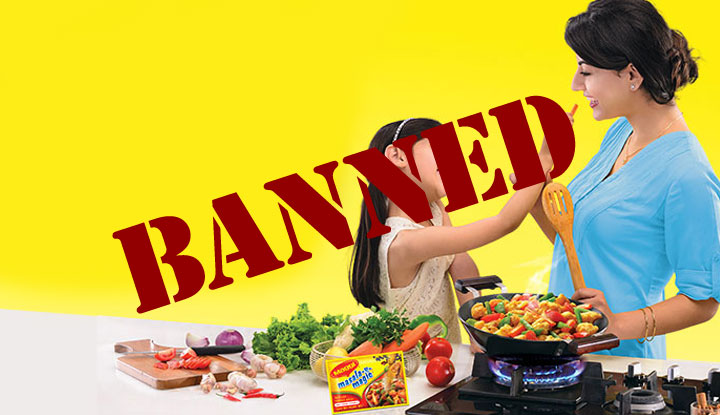
Millions of Indians cannot imagine life without Maggi—Nestle’s popular instant noodle brand. The brand was a diet staple across India and probably the only product that transcended caste, economic and religious barriers.
Maggi was a midnight snack in college dormitories, a comfort food, and perfect for a rainy day. But then there was trouble in paradise. Food inspectors found dangerously high levels of lead and monosodium glutamate in the product and shortly after, Maggi was determined to be unsuitable for human consumption. Just like that … a brand was banned and destroyed.
“The month-long fiasco could result in Maggi losing over $200 million (Rs1,283.6 crore) in brand value, according to Brand Finance, a brand valuation consultancy. The noodle brand—with a 63% market share in India—was valued at $2.4 billion (Rs15,405.7 crore) before the food safety issue, and ranked 23rd in Brand Finance’s list of most valuable food brands in the world” (Quartz).
Broken Brand Trust
The social media backlash quickly followed. Facebook feeds were flooded with people bitterly regretting the events that transpired. Indian newspapers splashed images of noodle packs being dumped for incineration. States banned Maggi, shops and college canteens took the brand off the shelves and a dark cloud descended on Maggi enthusiasts like myself.
We read, with scorn, articles that told us what ‘healthy’ snacks we can supplement instead of Maggi. Nothing, just nothing, could replace the familiar and popular brand. Yet, we did not dare. The stocks in our cupboards lay untouched with the test results hanging heavy like lead.
Industry experts will say a lot of things about how Maggi handled the situation. Perhaps Nestle could have been more proactive in addressing consumer concerns; or more aggressive and visible. But no matter what the brand would have done rebuilding their credibility with Indian consumers is going to take them decades. No matter how much I love Maggi, it will take a long time to eat another bowl—even when tests in the UK have cleared the brand of all charges.

This scenario tells us just how tumulus brand equity has become; and how quickly it can be lost. News, true or false, spreads like wildfire. Often times, news leaves devastation in its wake. Too dramatic? Perhaps. Although, nowhere close to what happened to Nestle almost overnight.
Several years ago, a similar incident happened to Cadbury’s Dairy Milk Chocolate Bar. Some Indian consumers found worms in the chocolates raising concerns about the quality of the product.
“In less than two weeks, the company launched a PR campaign … And three months later, came an ad campaign.” Experts agree that “Cadbury moved quickly to bear the cost of damage. And thanks to its equity with the consumers, Cadbury’s won back consumer confidence, with hit on sales notwithstanding.”
Despite it all, the blot remains. When I do buy a bar I look carefully for signs of bug infestation.
Brand Fallout
Disaster can hit any brand, but can the damage be contained? Perhaps if companies change the approach they take to crisis management. As a brand it’s important to understand one key change that’s happened in the past decade or so – if you make a mistake, the possibility of your mistake going viral is high. However, any countermeasures you take … the message travels slow.
In today’s context it’s more important to build a resilient brand that can take these hits and still survive. This starts by building a brand based on trust. Incidentally that was Cadbury India’s damage control strategy—a campaign called Vishwas, which literally means trust.
Consumer Trust
Building consumer trust is important if you want to retain their business; even in the face of adversity. Honesty in communication, transparency in process, admitting to mistakes when they happen, and proactive customer support are some of the building blocks of trust. This needs to be built into your business operations the moment you open your doors.
Take for instance a scenario that happened to me. I had some guests coming over for dinner and I hadn’t been grocery shopping.
A new grocery delivery service in town was offering to deliver groceries in 3 hours once an online order is placed. So, I ordered my groceries at 5:30pm. Fast forward to 10:00pm, and 2 calls to their customer service center later, there was no sign of my order.
I tried this service due to their marketing promise of 3 hour delivery. They failed to deliver and immediately lost credibility. Now their claim, and subsequent ones, will fall on deaf ears and be viewed as a mere marketing gimmick. This a dangerous place to be in, because customers are once burnt twice shy and will never trust you again.
Ultimately, customers trust brands that take them along on their journey, engage them and make them a part of their story. Ask them: “What can we do to meet your needs? What can we do to fix your problem?” Most importantly, tell them why you are doing it; and share your purpose.
What do you think brands can do to build trust? Share your thoughts in the comments.
This article has been edited and condensed.
Supriya Jain is the Founder of Miitra, a social organization for the elderly and teztadka a Bangalor-based restaurant serving North Indian cuisine. Supriya is also a self-proclaimed wordsmith and a foodie. A marketer by profession she also heads the Global Thought Leadership Marketing Initiative at Wipro Ltd. In this role she has successfully revamped content strategy, revitalized social presence, and contextualized Wipro’s point of view by institutionalizing experiential and real time thought leadership. Connect with @jainsupriya on Twitter.
© YFS Magazine. All Rights Reserved. Copying prohibited. All material is protected by U.S. and international copyright laws. Unauthorized reproduction or distribution of this material is prohibited. Sharing of this material under Attribution-NonCommercial-NoDerivatives 4.0 International terms, listed here, is permitted.













